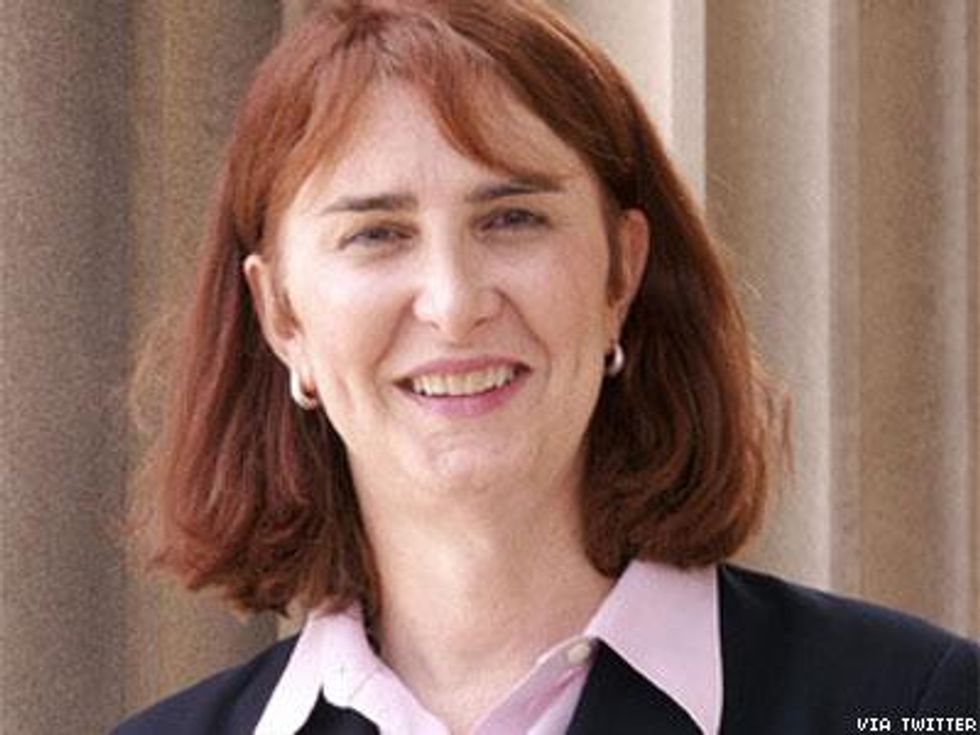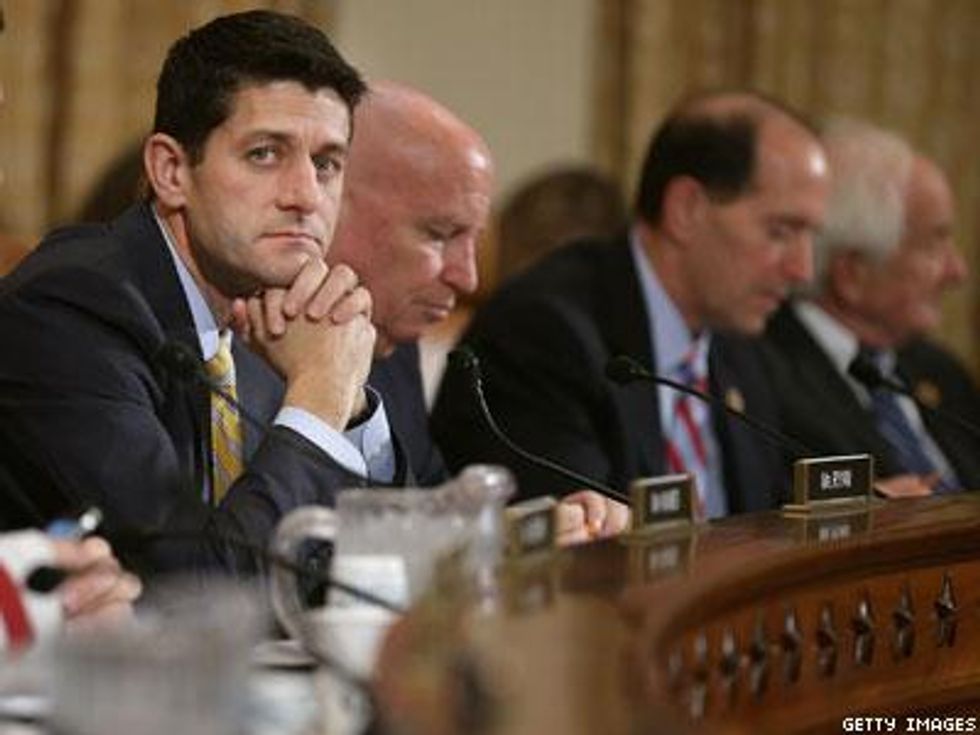When the U.S. Senate passed the Employment Non-Discrimination Act Thursday, the chamber made history. Not only because of the sweeping bipartisan support for the legislation -- the final tally was 64-32, with 10 Republican senators casting "aye" votes -- but also because for the first time in U.S. history, the Senate approved a bill that protected transgender Americans from discrimination in the workplace.
The last time the Senate debated ENDA was back in 1996, when the bill narrowly failed. That same month, the Senate approved the now-defunct Defense of Marriage Act.
And in 2007, when Democrats controlled the House but not the Senate or the White House, out legislator Barney Frank ignited a firestorm when he announced that he was removing gender identity protections from that year's version of ENDA, because he didn't think the bill could pass while including these provisions. Frank suggested proposing a second bill that would outlaw discrimination on the basis of gender identity.
In early October of that year, leaders from 282 national, state, and local equality groups signed on to a letter drafted by the National Gay and Lesbian Task Force demanding that Congress reject any version of ENDA that did not explicitly protect transgender Americans.
"We ask and hope that in this moment of truth, you will stand for the courage real leadership sometimes demands," reads the letter, addressed to then-speaker Nancy Pelosi and the entire House. "The correct course in this case and on this legislation is strikingly clear. We oppose legislation that leaves part of our community without protections and basic security that the rest of us are provided." [Emphasis original.]
Notably absent from that list of signatories was the Human Rights Campaign, which proudly proclaims itself the nation's largest LGBT advocacy organization. After fierce backlash from activists across the ideological spectrum, HRC signed on to a letter asking the chairman of the House Committee on Education and Labor to cancel the trans-exclusive bill's scheduled markup, calling Frank's two-bill strategy a "mistake." But on October 18, the committee passed an ENDA that would have outlawed discrimination based on sexual orientation only.
That same day, then-Rep. Tammy Baldwin introduced an amendment to restore the bill's gender identity protections, but she was ultimately forced to withdraw the amendment without a vote.
On November 7, 2007, Frank, the bill's chief sponsor, addressed his colleagues in the House.
"I am struck by the eagerness of some people, frankly, to use that group as a weapon with which to defeat the whole bill," said the Massachusetts Democrat. "If we do not have the votes to go forward with as much as we would like to do, do we then abandon any effort? And do we allow those who are opposed to any progress at all in the antidiscrimination fight, in this area, to use a particular group as a way to prevent progress? I hope we will go forward today and do as much as we can."
That day, the House passed a noninclusive ENDA 235-184. But with no scheduled date to consider the legislation in the Senate, the bill was rendered effectively dead.
 But this year everything's different. Longtime activists and lobbyists contend that the fervent backlash regarding a trans-exclusive ENDA taught the lobbying groups of Gay Inc. a lesson. When asked what would stop this year's legislation from suffering a similar dissection, Mara Keisling, executive director of the National Center for Transgender Equality, chuckles.
But this year everything's different. Longtime activists and lobbyists contend that the fervent backlash regarding a trans-exclusive ENDA taught the lobbying groups of Gay Inc. a lesson. When asked what would stop this year's legislation from suffering a similar dissection, Mara Keisling, executive director of the National Center for Transgender Equality, chuckles.
"Well, one thing that happened is 2007," she says. "I think people saw how much it meant. ... I think there were some people involved who did not understand how the LGBT community has evolved -- had evolved up to that point -- and is evolving further still."
Indeed, HRC officials tell The Advocate there's no way their group today would back an ENDA that didn't include transgender protections.
"We are preparing for a number of anticipated poison-pill amendments that anti-LGBT lawmakers may try to use to derail the bill," says HRC director of communications Michael Cole-Schwartz. "We are fully committed to defeating them, and even the idea of a noninclusive workplace protections bill is completely unacceptable to HRC."
Transgender activist, author, and former Navy SEAL Kristin Beck agrees. Trans inclusion "may become a bargaining tool for the people who oppose the bill as it did in 2007," speculates Beck, "but the supporters of the bill have come to understand how important it is to keep the community together, and get freedom and equality for all people."
And this year, those supporters mobilized in a novel way that seems to have had a sizable impact on the legislation's success -- at least in the Senate.
Americans for Workplace Opportunity is a first-of-its-kind bipartisan coalition aiming to advance ENDA through Congress. The campaign's steering committee is made up of 11 organizations: the American Civil Liberties Union, the American Federation of State, County, and Municipal Employees, the American Federation of Teachers, the American Unity Fund, Communications Workers of America, Gill Action, the Human Rights Campaign, the Leadership Conference on Civil and Human Rights, the National Center for Transgender Equality, the National Gay and Lesbian Task Force, and the Service Employees International Union.
Keisling, whose organization, NCTE, is on the steering committee, commends the broad partnership as "the first of its kind in the movement around anything other than marriage."
"It was an on-the-ground and an on-the-hill effort to really professionally and aggressively win over votes," explains Keisling. "And it really paid off."
The centralized coalition allowed ENDA supporters to present a unified front when it came to the specifics of the legislation. Calling a trans-exclusive ENDA a "nonstarter" for Americans for Workplace Opportunity, campaign manager Matt McTighe says his team is still bracing for amendments from conservative lawmakers aimed at gutting the bill.
"Anything is possible," McTighe tells The Advocate, "but senators only have to look at what small and large businesses are already doing when it comes to protecting their LGBT employees to see such amendments for what they are: scare tactics."
 But those scare tactics are exactly what right-wing groups are employing to rile up their bases in opposition to ENDA.
But those scare tactics are exactly what right-wing groups are employing to rile up their bases in opposition to ENDA.
Along with an unhealthy dose of misinformation about the scope and impact of the bill, so-called Christian groups have been hounding their mailing lists with shrill warnings about the dangers of ENDA for months.
"Intended to give special protection to homosexuals and cross-dressers, the bill would further burden small businesses and muzzle those with a biblical worldview," cries the anti-LGBT Liberty Counsel in an email sent to supporters October 29. "In other words, if an employer instructed a male employee he could not use the women's restroom, that employer could be in violation of ENDA and face federal sanctions."
The Traditional Values Coalition went even further in a frantic fund-raising pitch sent to supporters October 25.
"You see, should ENDA pass it will override the laws in 33 states and force schools to hire and retain transgendered teachers," claimed the group, which purports to focus on "religious liberties, marriage, the right to life, the homosexual agenda, pornography, family tax relief and education." "Every school administrator will be forbidden by law from reassigning or not hiring any transgender, she-male or other psychologically unhealthy teacher, as this would be considered 'discrimination' under ENDA. It will be illegal even to reassign these psychologically unhealthy teachers to office jobs away from children."
Of course, that's patently false. The law would by no means mandate that an employer hire someone who is gay or transgender, but rather prohibit that employer from firing or not hiring an employee for no other reason than their sexual orientation or gender identity.
And those who support ENDA and are closely familiar with the legislation recognize that the transphobic scare tactics hardly pass for legitimate debate.
"It is no longer acceptable, certainly in the [LGBT equality] movement, but really even in the community, to be too exclusionary," explains Keisling. "We're not a community you can bash anymore."
Based on this week's debate in the Senate, legislators realize that too.
Throughout more than two days of testimony, just one senator rose to speak in opposition to the bill. Indiana Republican Dan Coates told his colleagues to oppose the bill because it would infringe upon the religious freedom of business owners. The New Civil Rights Movement notes that Coates lamented that the bill's existing religious exemptions "do not extend to all organizations that wish to adhere to their moral or religious beliefs in their hiring practices."
Yet no one claimed ENDA would allow men to infiltrate women's bathrooms, and even right-wing Tea Party Republicans were notably silent as the chamber considered the bill.
Senators also rejected an amendment proposed by Pennsylvania Republican Pat Toomey that would have expanded the law's religious exemptions to include organizations run by faith-based groups that partake in secular activities. Although the amendment was defeated by a vote of 43-55, Toomey still cast his vote in favor of ENDA Thursday afternoon. Of course, the Senate had already adopted language assuring that religious institutions and clergy would not be compelled to adhere to the law's antidiscrimination stipulations, but even conservative Arizona senator John McCain voted against expanding the religious exemptions.
"It was a real bipartisan effort," says Keisling. "And that's a really big chunk of the United States represented by those Republican senators who stepped up. So yeah, it's a really good first step. But this is really just a first step."
The next step -- introducing and debating the bill in the House of Representatives -- could be quite a doozy, though.
 "The United States House is so incredibly messed up, I don't know if anybody knows how to get anything through the House," Keisling says. "I don't want to say that we can't do it, but it's not obvious yet what the clear path is to get it done."
"The United States House is so incredibly messed up, I don't know if anybody knows how to get anything through the House," Keisling says. "I don't want to say that we can't do it, but it's not obvious yet what the clear path is to get it done."
But just because some advocates are skeptical that the legislation can make it through the House doesn't mean legislators, activists, and even the president aren't putting pressure on the Republican-controlled chamber.
"One party in one house of Congress should not stand in the way of millions of Americans who want to go to work each day and simply be judged by the job they do," said President Obama in a statement released after the Senate's vote Thursday. "I urge the House Republican leadership to bring this bill to the floor for a vote and send it to my desk so I can sign it into law. On that day, our nation will take another historic step toward fulfilling the founding ideals that define us as Americans."
In the past, former vice presidential hopeful Paul Ryan, a House member from Wisconsin, has said that he'll only vote for ENDA if it doesn't include gender identity protections.
In 2007, Ryan was one of 35 House Republicans who voted for the sexual orientation-only ENDA. According to ThinkProgress, Ryan pushed then-bill sponsor Frank to drop the protections for transgender Americans, saying he could not vote for the bill if it included such language.
"It makes it something you can't vote for," Ryan said. "I think ENDA's the right thing to do, but transgender language changes the equation."
A 2010 article from Roll Call indicates similar hesitance to support a trans-inclusive ENDA among other conservative members of the House. Ohio Republican Pat Tiberi told Roll Call he thought protecting transgender Americans from discrimination in the workplace was "going beyond what the original intent [of the bill] was."
But whether or not members of the House will have a chance to debate the bill remains to be seen. On Monday, a spokeswoman for House Speaker John Boehner said the speaker believes ENDA will lead to an increase in "frivolous litigation" and will be bad for business, and falsely claimed that it's already illegal to fire someone for being gay.
While Boehner hasn't provided much hope, advocates who want to see the bill become law aren't letting up on the pressure. Sen. Tammy Baldwin, the first openly gay person elected to the U.S. Senate, delivered a message directly to Speaker Boehner -- a man she's likely well acquainted with, after serving with him in the House of Representatives from 1999 until this year. Boehner has been representing Ohio's Eighth Congressional District in the House since 1991.
Speaking with MSNBC just before she cast her final vote for ENDA, Baldwin evoked a recent blight on the Republican's record in urging him to do the right thing.
"I'd say what we said during the shutdown: Just bring it up for a vote," the senator demanded. "Because I feel that the House, if given the opportunity to vote up or down against discrimination in employment, against the LGBT community, that we'd win that vote. We'd win that day."
Beck, the trans former Navy SEAL, agrees, albeit incredulously.
"I find it unbelievable that in a country that touts equality and freedom we are still arguing over rights of equality in the work place for anyone," says Beck. "I think the problem is that people just don't know this truth, and how disrupting it really is to millions of Americans."


 But this year everything's different. Longtime activists and lobbyists contend that the fervent backlash regarding a trans-exclusive ENDA taught the lobbying groups of Gay Inc. a lesson. When asked what would stop this year's legislation from suffering a similar dissection, Mara Keisling, executive director of the
But this year everything's different. Longtime activists and lobbyists contend that the fervent backlash regarding a trans-exclusive ENDA taught the lobbying groups of Gay Inc. a lesson. When asked what would stop this year's legislation from suffering a similar dissection, Mara Keisling, executive director of the  But those scare tactics are exactly what right-wing groups are employing to rile up their bases in opposition to ENDA.
But those scare tactics are exactly what right-wing groups are employing to rile up their bases in opposition to ENDA. "The United States House is so incredibly messed up, I don't know if anybody knows how to get anything through the House," Keisling says. "I don't want to say that we can't do it, but it's not obvious yet what the clear path is to get it done."
"The United States House is so incredibly messed up, I don't know if anybody knows how to get anything through the House," Keisling says. "I don't want to say that we can't do it, but it's not obvious yet what the clear path is to get it done."


































































Charlie Kirk DID say stoning gay people was the 'perfect law' — and these other heinous quotes